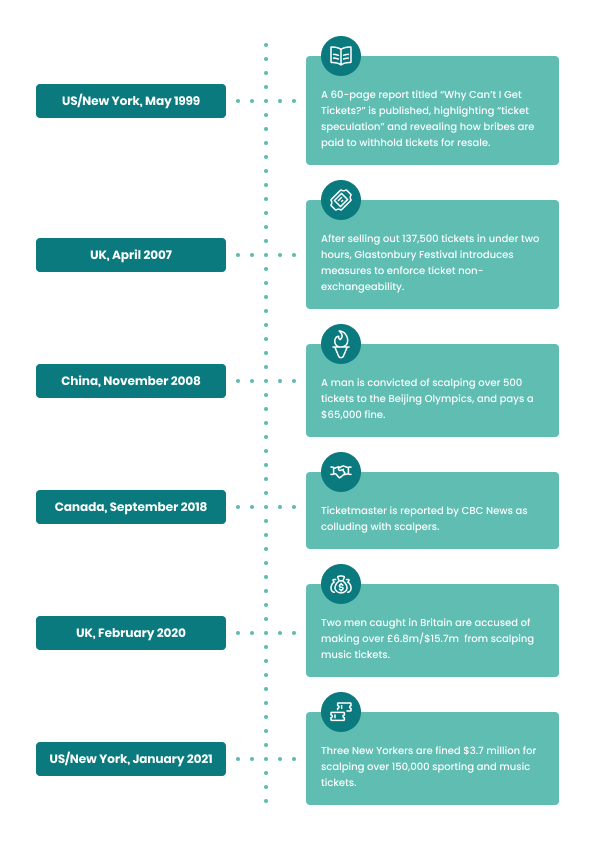What Is Ticket Scalping?
Ticket scalping is the practice of using bots to bulk buy tickets from licensed sources and then sell them for a profit. These can be tickets of any type but often involve major sports and music events. Sometimes, you hear this referred to as ticket touting or ticket reselling as well.
A whopping 40% of all ticket purchases online are estimated to be by scalper bots, according to Imperva. These tickets are bought by automated software in order to be resold at a higher price. This conclusion was reached after studying 180 different ticketing websites.
Ticket scalping is one of the key threats faced by the ticketing industry, resulting in lost revenue to secondary marketplaces, as well as reputational damage and even, potentially, loss of partnerships with organizers and other stakeholders.
In fact, at least two popular ticketing brands have been implicated in scalping scams in the past, in which they were found to be accomplices, so there is also the risk of fines or – even worse – legal repercussions for companies.
How Does Ticket Scalping Work?
- The fraudster identifies an event to target. This can be related to music, sports or culture. Further, we have seen the same with political events, stand-up comedy performances, as well as live recordings of television shows. The one common denominator is that the scammer expects the event will be very popular – enough to both be sold out and have fans pay dearly to buy a coveted ticket.
2. They prepare their scalping software and tools. These can include:
- auto refreshers, to check when the tickets have gone on sale
- API scraper scripts, to set up macros that will do a series of tasks automatically, e.g. fill in forms and details
- pre-bots, to automatically set up accounts on several websites
- form filler scripts
- fake IDs, stolen fullz of existing people or synthetic IDs, if there is a need to provide identification
- Having set up the required tools and scripts, as well as security measures to avoid getting caught, the scalper just needs to wait for the tickets to go live – at which point the software will buy them in bulk, within seconds.
- The scalper will make moves to resell the tickets either right away or at a later date, through various methods including social media, specialized websites, classified ads and more. Of course, tickets are resold by scalpers on the dark web, too. This depends on the type of the tickets, the nature of the event, its date as well as the age and habits of the target audience.
Ticket scalping is technically a form of arbitrage, because scalpers leverage the difference in ticket prices that result from a shortage in their supply. This shortage is artificial if the event has sold out because of the scalping, of course.
Is Ticket Scalping Illegal?
It depends. In most states and countries, ticket scalping is legal. Elsewhere, there are some laws in place, which can also vary greatly.
In the US, there is no federal law that addresses scalping. However, the BOTS Act of 2016 prohibits “the use of software to enable scalping”.
Further, some states have preventative legislation in place. Specifically, there are seven states where scalping is illegal because anyone who is selling or reselling tickets needs a special license (New York, Alabama, Georgia, New Jersey, Pennsylvania, Illinois, Massachusetts.)
A further four leave it up to individual municipalities to decide. There is also legislation to address the resale of specific types of tickets, including tickets for sports events.
In other countries, the laws are even more diverse. For example, in Australia’s New South Wales, scalping is illegal but only if you’re reselling at more than +10% of the ticket price.
Meanwhile, the EU has outlawed scalping bots with an April 2019 decision, after a Pan-European pressure group made up of musicians and event promoters called FEAT raised awareness of the issue. This has also been illegal in the UK since 2018.
Furthermore, knowingly buying tickets from a scalper can also incur fines in some regions.
How Did Scalping Tickets Start?
Once you understand how scalping actually works, it is not surprising to hear that reported cases of ticket scalping go back to at least the 19th century, when we have evidence that tickets to Charles Dickens’s tour in the States in the 1860s were scalped.
Buying tickets in bulk to create artificial shortages and then reselling at a higher price has been observed at various times in human history. Depending on what was popular in the era, ticket resellers might focus on a specific sport, genre of music, theatrical show, or comedy act.
What’s more, scalpers are opportunists by nature. They will identify emerging markets and try their hand at them before they get regulated – or even find new loopholes.
During the COVID-19 pandemic, when flights were being canceled in the face of national lockdowns, it was found that scalpers had acquired air tickets from various major US airports to China and were reselling them at exorbitant prices in the black market to Chinese students, who were trying to join their families in their home country.
A Global Times reporter investigating the phenomenon was quoted the mind-blowing price of 80,000 yuan (approximately USD 12,500) for just one ticket to a one-way flight.
Famous Ticket Scalping Examples
2008 Beijing Olympics
Perhaps the most famous event linked with ticket scalping in the 21st century was the 2008 Olympics in Beijing. In this case, the criminal used stolen identities, which he linked to individual purchases.
Taking advantage of the excitement surrounding the Olympic Games, the Chinese national spent 230,000 yuan (USD 34,000) to book 527 tickets to various events using the online ticketing portal. He was sentenced to jail time, as well as a fine.
What’s more, the authorities caught another 134 scalpers trying their hand at reselling Paralympic Games tickets. The police caught up to 99 detained in one day by posing as buyers outside the venues, where many scalpers attempted to sell their wares in person.
2017 Paradise Papers
One prolific ticket scalper was discovered following the leak of the so-called Paradise Papers containing, among others, evidence of a multi-million-dollar ticket scalping operation which StubHub was also accused of deliberately permitting to take place on its platform – and even assisting.
Quebec resident Julien Lavallée was reported to use bots to rapidly purchase tickets to entertainment events across the world. He then sold these on StubHub. For example, CBC writes that he automatically bought 310 tickets to three Adele concerts, and resold these for a whopping $52,000.

How to Stop Ticket Scalping Bots and Scalpers
Companies looking to stop scalping are advised to follow a layered, multi-pronged approach that’s informed by historical data and trends. Some of the tools to use are based on technology, while it is also a good idea to look into introducing buying limits and linking tickets to their buyers.
The question of how to prevent ticket scalping is a complicated one, because it comes in various guises and concerns several different industries. For instance, an event organizer is as interested in this as a platform built to facilitate the lawful reselling of unwanted tickets.
What’s more, some tickets are physical and others digital e-tickets. Travel companies and others tend to issue tickets linked to someone’s identity, though others are less personal, and so on.
There are, however, some tools and technologies that will help the vast majority of businesses. One involves developing a clearer idea of your customer: Find out who it is visiting the website and attempting these purchases, through data enrichment and digital footprinting. Depending on your circumstances, a user ranked as suspicious could be referred for manual review or blocked outright, for example.
In the case of scalping bots, strong script and bot detection and mitigation measures will certainly help. Meanwhile, machine learning algorithms can do a deep dive in historical data to discover patterns and modes of attack to learn from, improving your defenses and safeguarding your business in the future.
SEON’s expertise in fraud detection and prevention brings the right risk-scoring tools for bot mitigation and dozens more pain points.
Read More Here
Sources
My Law Questions: Is Scalping Tickets Illegal?
Imperva: Ticket Scalping Bots
FEAT: About FEAT
BBC News: Scalping: The teens making thousands selling consoles online
Australian consumer Law: Ticket Reselling
Congress.gov: S.3183 – BOTS Act of 2016
Global Times: Air ticket scalpers gouge desperate overseas Chinese
BBC News: Glastonbury tickets snapped up
CBC: Canadian scalper’s multimillion-dollar StubHub scheme exposed in Paradise Papers
Team USA: CHINA JAILS, FINES BEIJING OLYMPICS TICKET SCALPER







